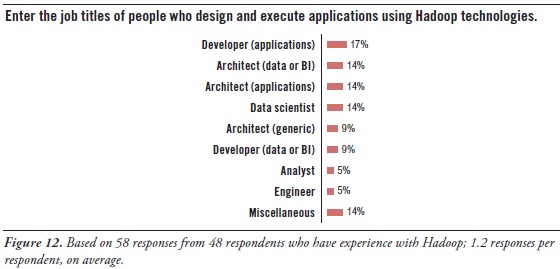
Job Titles for Hadoop Workers
By Philip Russom, TDWI Research Director
[
NOTE -- My new TDWI report “Integrating Hadoop into Business Intelligence (BI) and Data Warehousing (DW)” (Hadoop4BIDW) is finished and will be published in early April. I will broadcast the report’s Webinar on April 9, 2013. In the meantime, I’ll leak a few of the report’s findings in this blog series. Search Twitter for #Hadoop4BIDW, #Hadoop, and #TDWI to find other leaks. Enjoy!]
One way to get a sense of what kinds of technical specialists are working with HDFS and other Hadoop tools is to look at their job titles. So, this report’s survey asked a subset of respondents to enter the job titles of Hadoop workers. (See Figure 12 above.) Many users are concerned about acquiring the right people with the right skills for Hadoop, and this list of job titles can assist in that area.
Hadoop workers are typically architects, developers, data scientists, and analysts:
Architect. It’s interesting that the word architect appeared in more job titles than any other word, followed closely by the word developer. Among these, two titles stand out – data architect and application architect – plus miscellaneous titles like system architect and IT architect. Most architects (regardless of type) guide designs, set standards, and manage developers. So architects are most likely providing a management and/or governance function for Hadoop, since Hadoop has an impact on data, application, and system architectures.
Developer. Similar to the word architect, many job titles contained the word developer. Again, there’s a distinction between application developers and data (or BI) developers. Application developers may be there to satisfy Hadoop’s need for hand-coded solutions, regardless of the type of solution. And, as noted, some application groups have their own Hadoop cluster. The data and BI developers obviously bring their analytic expertise to Hadoop-based solutions.
Data Scientist. This job title has slowly gained popularity in recent years, and seems to be replacing the older position of business analyst. Another way to look at it is that some business analysts are proactively evolving into data scientists, because that’s what their organizations need from them. When done right, the data scientist’s job involves many skills, and most of those are quite challenging. For example, like a business analyst, the data scientist is also a hybrid worker who needs knowledge of both business and data (that is, data’s meaning, as well as its management). But the data scientist must be more technical than the average business analyst, doing far more hands-on work writing code, designing analytic models, creating ETL logic, modeling databases, writing very complex SQL, and so on. Note that these skills are typically required for high-quality big data analytics in a Hadoop environment, and the position of the data scientist originated for precisely that. Even so, TDWI sees the number of data scientists increasing across a wide range of organizations and industries, because they’re needed as analytic usage gets deeper and more sophisticated and as data sources and types diversify.
Analyst. Business analyst and data analyst job titles barely registered in the survey. Perhaps that’s because most business analysts rely heavily on SQL, relational databases, and other technologies for structured data, which are currently not well represented in Hadoop functionally. As noted, some analysts are becoming data scientists, as they evolve to satisfy new business requirements.
Miscellaneous. The remaining job titles are a mixed bag, ranging from engineers to marketers. This reminds us that big data analytics – and therefore Hadoop, too – is undergoing a democratization that makes it accessible to an ever-broadening range of end users who depend on data to do their jobs well.
Want more? Register for my Hadoop4BIDW Webinar, coming up April 9, 2013 at noon ET:
http://bit.ly/Hadoop13
Posted by Philip Russom, Ph.D.